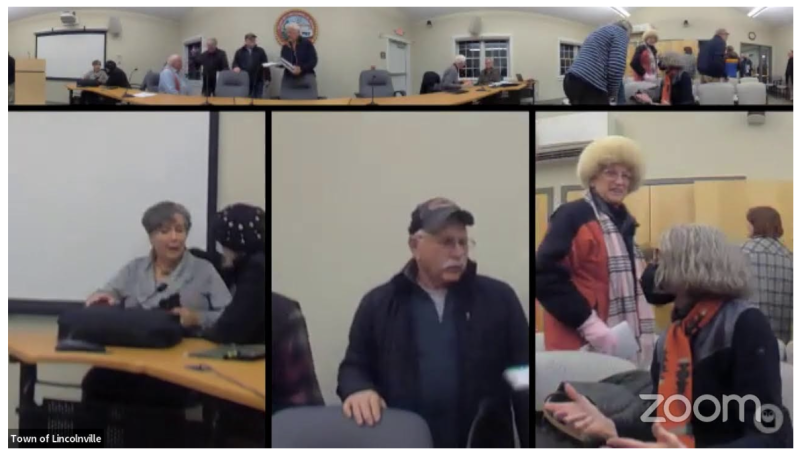LINCOLNVILLE — The meeting room at the Lincolnville Town Office was full Nov. 29 for a 6 p.m. public hearing on a proposed moratorium on major nonresidential site plans and not one person rose to voice objections to the measure.
Next will be a full town vote on the moratorium Dec. 11, 6 p.m., at the Lincolnville Central School.
And, despite the fact that the developers who had first approached the town about potentially siting a new unidentified retail store on a field at Drake Corner have yet to submit a full application, the town is proceeding with the moratorium vote. (See below for its full language.)
Lincolnville resident Becky Johnson asked at the outset of the hearing if the town had heard any further from the developer’s engineering company Gorrill Palmer. That South Portland-based engineering consulting firm had submitted on behalf of the North Carolina-based Primax Properties a sketch plan for a proposed retail store at Drake Corner.
Two Gorrill Palmer representatives had met with the Lincolnville Planning Board October 25 for a preliminary discussion about the plan, with the expectation that a full application would be forthcoming in early November.
At that meeting, Lincolnville’s Code Enforcement Officer Frank Therio had informed Gorrill Palmer engineers that the land survey on which the plans were based contained possible errors.
But at the November 28 Planning Board hearing, Therio said he had heard nothing more from the engineers since their October pre-application meeting.
“Absolutely zero, no phone calls, no email, no text,” said Therio.
Gorrill Palmer has yet to respond to a Nov. 30 inquiry from this reporter concerning whether a full application will be submitted.
Primax Properties LLC, based in Charlotte, North Carolina, describes itself as a, “real estate development and investment company focused on repetitive retail and commercial projects, nationwide, for our end-user tenants.” Its representative projects include a range of retail and restaurant chain businesses, such as Tractor Supply Company, Starbucks, Dollar General, Taco Bell, T.J. Maxx, West Marine, and more.
Resident David Perkins said Nov. 29 that some large commercial projects, such as what has been discussed, pose a threat to Lincolnville and the town needed at least 90 days to update its zoning and land use ordinances.
Lincolnville’s last update to its commercial site plan ordinance was in 2010.
He said the Select Board had taken no position on the moratorium. Should it be approved by the voters and enacted, it would be in effect 180 days from Nov. 13, “so our work will be cut out for us.”
It is possible to extend the moratorium, should the town need more time to craft ordinance changes. Any subsequent new ordinances or amendments would require a town vote before being enacted.
Resident Richard McKittrick said his concern had less to do with the project and more about Lincolnville's existing “general and vague standards.” He said, “we could be distracted by thinking about a particular project over the community at large,” and noted the town need tools to work with, “to help us all.”
Other residents raised concerns about watershed protections (the proposed retail store site lies within the Megunticook/Norton Pond watershed).
Therio explained that if an application is made for a development in the watershed, an applicant wold have to deposit funds in escrow, and, “we would demand an expert be brought in who is familiar with hydrology and watersheds.”
The expert would be hired by the town, not the developer.
As residents in favor of the moratorium finished speaking at the podium, the floor was opened to any opponents of the moratorium. No one responded to speak.
The hearing lasted approximately one hour, and by its end, resident Rosey Gerry commended the Planning Board, thanking, “each and every one of you for taking the time for a thankless job.”
The proposed moratorium reads:
Article 2. Shall an ordinance entitled “Town of Lincolnville Major Non-Residential Development Project Moratorium Ordinance” be enacted?
TOWN OF LINCOLNVILLE
MAJOR NON-RESIDENTIAL DEVELOPMENT PROJECT MORATORIUM ORDINANCE
Section 1. Definitions.
Development means a change in land use involving alteration of the land, water or vegetation, or the addition or alteration of buildings or structures, or other construction not naturally occurring.
Gross floor area means the sum of the gross horizontal areas of the floor(s) of a building or structure enclosed from the exterior face of exterior walls, or from the centerline of a wall separating two buildings.
Major Non-Residential Development Project means a Non-Residential Development Project involving the construction or addition of 4,000 square feet of gross non- residential floor area; or a Non-Residential Development Project that has the potential to generate more than 50 vehicle trips per peak hour or 400 trips per day; or a Non- Residential Development Project on a site with a slope of 20 degrees or greater; or a Non- Residential Development Project requiring a parking lot for 20 or more vehicles.
Non-Residential Development Project means development that does not involve lands, buildings or structures occupied, or to be occupied, for residential purposes.
Residential means the use or occupation of property for human habitation/living accommodations.
Town means the Town of Lincolnville, a municipal corporation organized and existing under the laws of the State of Maine.
Section 2. Moratorium Declared.
WHEREAS, the Town’s 2006 Comprehensive Plan proposes that the Town establish and adopt growth area districts on lands that (1) are physically suitable for development or redevelopment; (2) can be efficiently served by public facilities, including public utilities, roadways, fire protection, school buses, and the like; (3) contain sufficient area to accommodate projected growth; and (4) can provide a compact pattern of development within the existing natural constraints; and
WHEREAS, the Town’s 2006 Comprehensive Plan proposes that the Town establish and adopt rural districts in order to preserve the rural character of the Town, protect agricultural and forestry uses, and preserve open spaces and single-family residential dwellings with larger lot sizes; and
WHEREAS, the Town’s Land Use Ordinance has not yet been amended to adopt growth area districts or rural districts, such that all areas outside of shoreland districts are currently part of a general district where specific land uses are subject to minimal regulations and minimal locational requirements; and
WHEREAS, the Town’s Land Use Ordinance does contain commercial site plan review standards but does not contain any design standards for Non-Residential Development Projects or Major Non-Residential Development Projects; and
WHEREAS, all properties in the Town rely on wells for drinking water supply; WHEREAS, with the exception of a few properties at Lincolnville Beach, properties in
the Town rely on septic systems for wastewater treatment and disposal; and
WHEREAS, all or part of the watersheds for nine lakes and ponds in the Mid-Coast area are located in the Town; and
WHEREAS, lake and pond watersheds cover almost half of the Town’s 25,000 acres; and
WHEREAS, land use activities within these lake and pond watersheds can, and do, have far-reaching implications for the water quality of individual lakes and ponds; and
WHEREAS, Megunticook Lake and Norton Pond are listed on the Maine Department of Environmental Protection’s March 2023 Nonpoint Source Priority Watersheds “Threatened Lakes Priority List”; with Megunticook Lake listed as “sensitive” to additional inputs due to the lake’s hydrology and threats in the watershed as well as “sensitive due to sediment chemistry”, and with Norton Pond listed as “sensitive” to additional inputs due to the lake’s hydrology and threats in the watershed; and
WHEREAS, the quality of the Town’s lakes and ponds depends in part on phosphorus content, which controls the level of algae production in a water body; and
WHEREAS, phosphorous is typically associated with soil particle and organic matter, and it gets into the Town’s lakes and ponds in a variety of ways, including through the dissolved phosphorous in stormwater runoff and through groundwater from septic systems around the shoreline areas; and
WHEREAS, new development, soil erosion and inadequate shoreline septic systems each has the potential to increase the amount of phosphorous in lakes and ponds with developed or developing watersheds and, thereby, to decrease water quality; and
WHEREAS, the Town is suddenly under threat of a Major Non-Residential Development Project; and
WHEREAS, Major Non-Residential Development Projects were unanticipated and have not been adequately provided for in the Town’s Land Use Ordinance; and
WHEREAS, there is a strong likelihood that some areas of the Town may continue to be subjected to this development pressure due to the amount of undeveloped land, the nonexistence of any regulations or restrictions on the location of Major Non-Residential Development Projects, and the nonexistence of any regulations or restrictions on the design of buildings or structures comprising Major Non-Residential Development Projects; and
WHEREAS, continued development of such Major Non-Residential Development Projects pursuant to the Land Use Ordinance could overburden existing surface and groundwater water supply facilities in the reasonably foreseeable future;
WHEREAS, continued development of such Major Non-Residential Development Projects pursuant to the Land Use Ordinance could pose serious threats to the public health, safety, welfare and quality of life of the residents of the Town through the overdevelopment of parts of the Town with such projects without adequate provisions for issues such as land use compatibility, design standards, phosphorous control and water quality protection, and environmental degradation; and
WHEREAS, the Town’s current ordinances and other applicable laws, if any, are not adequate to prevent serious public harm possibly to be caused by the location of Major Non-Residential Development Projects in the Town, thereby necessitating a moratorium; and
WHEREAS, a moratorium is necessary to prevent an overburdening of public facilities that is reasonably foreseeable as the result of Major Non-Residential Development Projects being located in the Town; and
WHEREAS, the Town will need at least 180 days to study its ordinances to determine the implications of development proposals involving a Major Non-Residential Development Project and to develop, implement and adopt an ordinance or ordinance amendments to address these development pressures; and
WHEREAS, adoption of an such an ordinance or ordinance amendments requires a public hearing by the Planning Board and then must be voted upon at a Town Meeting; and
WHEREAS, in the judgment of the Town, these facts create an emergency within the meaning of 30-A M.R.S. § 4356(1)(A) and (B) and require this moratorium as immediately necessary for the preservation of the public health, safety and welfare;
NOW, THEREFORE, the Town hereby ordains that this Moratorium Ordinance be, and hereby is, enacted, and in furtherance thereof, the Town does hereby declare a moratorium on development proposals involving any Major Non-Residential Development Project. The moratorium shall remain in effect for one hundred and eighty (180) days from the date of applicability of this Moratorium Ordinance, unless extended or modified by the Select Board, for the express purpose of drafting an amendment or amendments to Town ordinances to protect the public from health and safety risks including, but not limited to, the potential adverse health, safety, land use compatibility, increased phosphorous runoff, decreased water quality, and environmental degradation effects of development proposals involving a Major Non-Residential Development Project if not properly regulated; and
BE IT FURTHER ORDAINED, that this Moratorium Ordinance shall apply to any new development proposals involving a Major Non-Residential Development Project after the November 13, 2023 applicability date of this Moratorium Ordinance; and
BE IT FURTHER ORDAINED, that notwithstanding the provisions of 1 M.R.S. § 302 or any other law to the contrary, this Moratorium Ordinance, when enacted, shall govern any new development proposal involving a Major Non-Residential Development Project for which an application for a license, building permit, site plan review and/or any other required land use approval has not been submitted and finally acted on by the Code Enforcement Officer, Planning Board, Board of Appeals or other Town official or administrative board or agency prior to November 13, 2023, the applicability date of this Moratorium Ordinance; and
BE IT FURTHER ORDAINED, that no person or organization shall start or engage in the construction or operation of a Major Non-Residential Development Project on or after the November 13, 2023 applicability date of this Moratorium Ordinance without complying with whatever ordinance amendment or amendments the Town may enact as a result of this moratorium; and
BE IT FURTHER ORDAINED, that during the time this moratorium is in effect, no officer, official, employee, office, administrative board or agency of the Town shall accept, process, approve, deny or in any other way act upon any application for a license, building permit, site plan review and/or any other required land use approval, and/or any other permits, licenses or approvals related to a Major Non-Residential Development Project; and
BE IT FURTHER ORDAINED, that those provisions of the Town’s Land Use Ordinance or any other ordinance that are inconsistent or conflicting with the provisions of this Moratorium Ordinance, including, without limitation, the requirements for review by the Code Enforcement Officer and/or Planning Board, are hereby repealed to the extent that they are applicable during the duration of the moratorium hereby ordained, but not otherwise; and
BE IT FURTHER ORDAINED, that to the extent any provision of this Moratorium Ordinance is deemed invalid by a court of competent jurisdiction, the balance of the Moratorium Ordinance shall remain valid; and
BE IT FURTHER ORDAINED, the Select Board is hereby authorized to institute any and all actions, either legal or equitable, that it deems necessary or appropriate to enforce the provisions of this Moratorium Ordinance.
Section 3. Violations; Civil Penalties.
Any violation of this Moratorium Ordinance is subject to an enforcement action under 30-A M.R.S. § 4452. Each day of violation shall constitute a separate violation of this Moratorium Ordinance, and the Town shall be entitled to all rights available to it in law and equity, including, but not limited to, fines and penalties in accordance with 30-A M.R.S. § 4452, injunctive relief, and its reasonable attorney’s fees and costs in prosecuting any such violations.
Section 4. Effective Date; Applicability Date.
This Moratorium Ordinance shall take effect immediately upon passage by Town Meeting. The applicability date of this Moratorium Ordinance is November 13, 2023.
Reach Lynda Clancy at lyndaclancy@penbaypilot.com; 207-706-6657





















-page-001172f.jpg?itok=ehqZjoJl)
-page-001_00111.jpg?itok=-OOqh5TZ)
-page-001_18cfb.jpg?itok=1VajjwvN)
-page-001_24246.jpg?itok=O5BwbYqe)
-page-001_34b6d.jpg?itok=n4klhTwL)
-page-001_4ecf4.jpg?itok=oGekJdvJ)
-page-001_53818.jpg?itok=jklb5_hs)
-page-001_649e6.jpg?itok=sMjpHMOQ)
-page-001_75e17.jpg?itok=fM1ee9ED)




